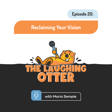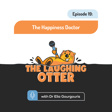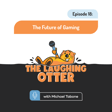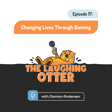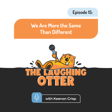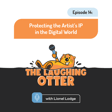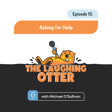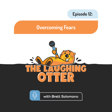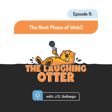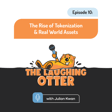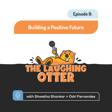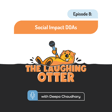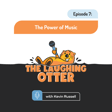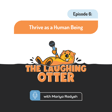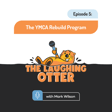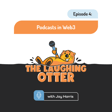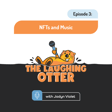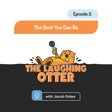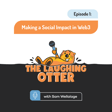Introduction to Mothership and Krystal Renoff
00:00:07
Speaker
Hello, everyone, and welcome to another episode of Otterly Positive Talks. I'm Jeff Bonesberger, your host. And we got an interesting conversation happening today. We got Krystal Renoff. She's the founder and CEO of Mothership, which is using blockchain AI.
00:00:28
Speaker
and other technologies to improve the lives of people, children across the board from foster children to special care. Crystal is just doing amazing work using this technology.
Mothership's Mission in Child Welfare
00:00:42
Speaker
Welcome to the show, Crystal. Thanks, Jeff. I'm really happy to be here.
00:00:47
Speaker
Yeah. So I think we're going to, we're going to Del dive right in and maybe you can give us an overview of mothership and then we'll get, talk a little bit more about why you got started and where you, where you're heading. So yeah, just share with the listeners about mothership. Sure. Yeah. Um, so the mothership is an artificial intelligence. Actually it's a social intelligence.
00:01:13
Speaker
And basically what it does is it provides tailored interventions to various conflicts. And the conflict right now that we're really working to solve is relational conflicts and specifically conflicts that are within the child welfare system. So we're working with families that might be having to
00:01:39
Speaker
work with CPS or families that are foster parents that have children from the foster care system and also we're working towards reunification. And so what our system does is it actually analyzes the child's behaviors and then from those behaviors it offers tailored interventions to help mitigate, modify and eliminate those behaviors.
00:02:07
Speaker
And we'll also be projecting those patterns so the parents can see just how the behaviors change once those interventions are applied. That's pretty cool. So when did you get started on this and why?
Krystal's Personal Motivation
00:02:25
Speaker
I got started October 2023. And really I got started on this because I
00:02:37
Speaker
I have my own experience in foster care. I was sexually abused and physically abused when I was three years old. And I went into the foster care system. And life has been hard. Things have been challenging. My life has not been easy in the slightest. And I would like to help these children the best I can, because I know what it's like to be
00:03:06
Speaker
in the system and I know what it's like to feel like you're not understood because when you experience trauma or you experience going from home to home or just different placements or just different forms of trauma and things like that, it really does affect you. It affects the way you think about things. It affects the way you tend to see logic.
00:03:32
Speaker
And I really want to help these children and families. I want to help them be able to build stronger connections together and understand each other more and really work through those challenges. What do you think the major challenges are right now facing the families?
Challenges in Child Welfare System
00:03:57
Speaker
Like where is the gap that you're feeling?
00:04:01
Speaker
A lot of research that I've done on the system shows me a couple of things actually. One is that there's not really a lot of support for biological families. There's a lot of support for foster families, but there's really not a lot of support for biological families that are struggling and trying to do what's best for their children. Another thing that is quite apparent is that
00:04:29
Speaker
there is so much demand now on the workers and on the system itself that some facilities are actually going into deficits in their budget. And this is because there's an overload of behavioral children. You see what happened during COVID is a lot of different inpatients and group homes and things like that were kind of shut down. And a lot of the children were kind of backed up in the system. And now the system
00:04:59
Speaker
is sort of bogged down with children that have nowhere to go. And it's really affecting, it's not just affecting families and children, it's also affecting caseworkers and social workers who are staying overnight in hotels to make sure these children are taken care of. So it goes far beyond just taking care of these children and these families. It goes to the system itself that's really, really could use quite an improvement. And we believe that
00:05:30
Speaker
by using artificial intelligence and applying it in places like in the home or in school and having this tool, basically. It's a tool for families and the system to be able to use and enhance their ability to really care for these children and families.
Pilot Study and Future Plans
00:05:56
Speaker
within your system, what stage are you guys at as far as attacking these issues? So right now we're currently in our MVP development. Ultimately, our goal is to conduct a pilot study, which will basically measure the impact of our system. So it'll measure the impact of artificial intelligence compared to if it was
00:06:27
Speaker
a therapist or some kind of service provider, something like that. But what we're actually doing is we're taking the logic of the problem and we're solving it based on that. So it's a very complex system. And these complexities are really what is going to offer the best solution for these children and families.
00:06:49
Speaker
Are you working with, it sounds like something that you'd work closely with not-for-profits, universities, doctors, care workers, that sort of thing. Do you have a growing network, I assume, around this area? Yeah, actually, we do have some affiliates in the system. We have some nonprofits that we've been talking to, and I also have a research team
00:07:14
Speaker
with a psychology professor out of Collins College from Texas. And our next step is to conduct a pilot study to really measure that impact with artificial intelligence. And what we'll be doing is we'll be basically measuring the changes that the interventions applied create. And we're doing it in a very,
00:07:43
Speaker
scientific method, very scientific form, we're actually breaking the behaviors into various dimensions, which when you hear dimension, a lot of people think about space. But when you talk about behavior dimensions, we're looking at things of how often the behavior is occurring. So frequency, we're looking at the duration, like how long the behavior lasts for. And then we're looking at intensity as well, like how intense that behavior is on a specific scale.
00:08:12
Speaker
And we really want to try to measure the changes according to these different dimensions. And what we'll do is we'll compare it to services if a child was just getting normal therapeutic services or just services from social work or things like that. So we're really taking it to the next level, trying to enhance the care management using artificial intelligence.
00:08:40
Speaker
So do you have any theories or predictions on what the difference will be or any particular areas that you think will be affected with, I guess, greater results than other areas? Or are you leaving that up to the data? Yeah, we're leaving it up to the data. But I do have a hypothesis in that we will see some extraordinary results.
00:09:10
Speaker
And I think that we'll be able to recognize some patterns in the behavior that we probably might not even caught onto. Basically, our system is going to physically project that conflict so that a user will be able to identify it in pattern. And based on that pattern, it'll drive them to want to apply those interventions more.
00:09:40
Speaker
a little bit of psychology and it's a little bit of scientific principles and it's a lot of artificial intelligence. Once you run these clinical trials, where do you see the next phase going?
Future Applications and Beta Launch
00:10:00
Speaker
Are there other areas of interest that you'll be focusing on?
00:10:07
Speaker
Yeah, absolutely. So once we finish with these clinical trials, we're going to immediately jump to our beta launch. And we have built a high level roadmap to work with nonprofits within the system. Once we are able to tackle the child welfare system, we actually would like to pivot to a few places. One of those places being the juvenile justice system, we'd like to
00:10:35
Speaker
basically reskin our system and work with parolees, young parolees, and offer those same interventions. But keep in mind too, and I want to say this because I didn't mention this before, we will always make sure that there's a human in the mix. So there will always be a human to, our system will basically be analyzing either the conversation between two humans or if
00:11:03
Speaker
they don't want to get the other person involved, like let's say with child welfare, it's usually a social worker or case manager, then they can opt just to use the artificial intelligence. But we'll always have a human in the mix. So we always keep that component, because that's really important when it comes to human connection. So we'll be doing the same thing in the juvenile justice system. And on the other, in the system, we'll have the parole officer, and then we'll have the parolee.
00:11:33
Speaker
Aside from that, actually, we do plan to reskin our system a few other ways. In fact, one of the ways that I'd like to use the system is to help prevent child suicide. You see, because we'll be able to basically project those patterns of depression and we'll see the change points of where, you know, we could probably most likely mitigate
00:12:02
Speaker
something really negative from happening. And there are other forms that we'd like to use our system with as well. It's funny because my chief innovation officer, he was a systems engineer at NASA. And when he came on board, he was like, this is a great way to, you know, regulate different things and
00:12:31
Speaker
You know, it's crazy because I don't want to say too much, but, um, it actually goes back to my original system design where I would actually implement social media. So, um, the, this, this system has basically taken off and has created a mind of its own and we're pivoting in so many different directions. And really it's a social intelligence. It's, it's meant to help society.
00:12:58
Speaker
in so many ways and really just create better outcomes for not just children, but people. And, you know, by offering these interventions to problems that people have in their everyday lives, we can really, you know, impact society. And that's the mission of the mothership is to really impact society.
00:13:25
Speaker
Well, it's a, it's definitely a wonderful goal. It's much in line with the Laughing Auditor's belief of just making the world a happier place, one person at a time. And it's always been my philosophy that, and my belief that if you start with children and you give them a really solid framework and infrastructure to build on.
00:13:50
Speaker
and you make them happy children, then a lot of the adult issues go away because so many problems in adult life can be linked back to things that happened as a child. And that's people who come from normal homes.
00:14:05
Speaker
Um, or stable homes, let alone people who are within the, within a, the foster care system and getting bounced around. So it's a, it's a wonderful vision that you have and it only stands to reason.
00:14:24
Speaker
to be able to use data and to find those trigger points, because there are so many similarities between two individuals. Yeah, it's great. So what are some, like,
00:14:42
Speaker
We've talked a little bit about the problem now, but what are some of the outcomes that you see happening? I know we talked offline, there's some pretty horrific stats around child trafficking and stuff like that.
00:15:04
Speaker
that your system is going to be attacking. So maybe we'll spin a little bit and talk about some real world positives that the mothership is going to cause.
Impact on Child Trafficking and Outcomes
00:15:19
Speaker
Yeah, sure. So when it comes to child trafficking and the child welfare system, especially
00:15:27
Speaker
The numbers are pretty high for the amount of children that are child trafficked or human trafficked from the system and that number is about 60%. And that's because these children are higher risk because they're at higher risk to elope or run away from home and then they're targeted. They're also targeted because a lot of times the traffickers know that they can play into the psyche of these children who basically, or teenagers most likely,
00:15:54
Speaker
children and teenagers that run away and are frustrated with the system, are frustrated with going from home to home and feel like they would do better on their own. And they play into that psyche. So the mothership is actually integrating a feature where we're going to be
00:16:11
Speaker
using our artificial intelligence to track these children. And this will not only help us gain a better understanding of their life and their preferences so that we can really help tailor those solutions towards their personality and the things they like to do, but it also gives us a little bit of an eye in the sky to keep them safe. And I mean, it's just, you know, I can really see this helping
00:16:38
Speaker
prevent those numbers from happening. And there's a lot of poor outcomes that children in the system, not just dealing with child trafficking, but there's a very high incarceration rate. There's a high homelessness rate. And these are real problems that society is dealing with.
00:17:02
Speaker
you know, these children, they start off with such a difficult life. I mean, nobody expects the hand that they're given in life, right? But I mean, to be given a hand, you know, like, especially like my own hand that was given to me, you know, nobody expects that. And so, you know, I really see the mothership being able to impact society and hopefully, you know, create better connections and relationships so people can live healthier,
00:17:30
Speaker
more mentally stable lives. And really, you know, what our system basically is doing is, you know, based on different scientific principles, human bonding is a necessity. And when you're young, and you don't have that bond, it really affects you. And it really affects the way your brain processes. And that therefore,
00:17:53
Speaker
leads to adverse behaviors and poor outcomes. So if we can kind of nip that in the bud and create better, stronger, deeper human connections, then we can basically impact society in a way that's never been done before. We could see changes in the rates of homelessness. We could see changes in the rates of incarceration. We could see a happier, more peaceful society.
00:18:22
Speaker
It's pretty amazing what the mothership is getting into. When we first met, maybe six months ago, and he told me about what the mothership was doing, I knew right then that the Laughing Otter had to support what you're doing because it's such a big part.
00:18:45
Speaker
of the laughing order to give kids a fair start in life. It's interesting you talk about the hand that you're dealt and as I've gotten older, I've come to realize the people who call the loudest for everybody deserves what they get.
00:19:11
Speaker
they tend to be the ones that have the largest handout or the best hand to start with. I would have fallen in that camp 20 some years ago when I came out of my MBA, I had a certain view of the world. But now I realize the reality of how difficult it is
00:19:36
Speaker
if you haven't even been given the tools to play in the game. And so, yeah, it's great what the mothership's doing. And the more kids that we can give that fair start to life, yeah, we'll just benefit as a society.
00:19:59
Speaker
Yeah, it's funny, it just seems so obvious. The cost to support a child when he's young compared to the cost of an adult caught in the system, it's night and day.
00:20:20
Speaker
All the evidence supports it and what's great about the mothership is you're going to create even more data and more evidence and then be able to channel that data and evidence into executable tasks like you said, real humans. That's admirable. What's the next 12 months look like for you?
MVP, Fundraising, and Policy Influence
00:20:46
Speaker
The next 12 months.
00:20:49
Speaker
In the next, I would say, month or two, we'll be finished with our MVP. And then we will be applying for different grants, different funding. We will be raising, we'll be raising an angel round.
00:21:08
Speaker
After we successfully raised the next step is the beta version, which will be basically, like I said, we have our high level roadmap built out with different affiliates in the system and we'll be piloting with some nonprofits to really push the system and push it to its limits basically.
00:21:36
Speaker
After that, I mean, once we, once we start getting a lot of different nonprofits on board and we're able to make a significant change in the system, because I have a feeling once one nonprofit comes on, then the rest are going to flow afterwards. And really what I hope to do with this system, and I know this sounds crazy to say, right, because it's a business and I'm not a nonprofit.
00:22:02
Speaker
But eventually I would like to have a nonprofit wing to the mothership and I would basically like to offer this system to the nonprofits and then move on to juvenile justice so that I know, okay, now my system, it does its good work and I can provide it to the system. And then that data is going to change a lot of policies and procedures and things like that too, which I think
00:22:33
Speaker
will drive a lot of changes in society. So yeah, I guess the next step would definitely be pivoting and re-skinning the system to help society another way.
00:22:48
Speaker
Sam, it's fantastic. We're definitely going to keep in touch and we're now joined at the hip, as they say, and the Latin Otter is going to be supporting the mothership in every way that we can. It's such a great initiative that you got going. And to be honest, it's one of the few AI projects that I've heard in a long time,
00:23:18
Speaker
that is really going to make a positive change to society. So if people want to learn more about the mothership and if investors, universities, not-for-profits, organizations want to get in touch with you, how do they find you?
00:23:39
Speaker
So my LinkedIn is really the best place to find me. So my name is Crystal. So it's C-R-Y-S-T-A-L. And my last name is Renoff. R-E-N as in Nancy. O-U-F as in Friday. My LinkedIn is great. You can add me on LinkedIn. And we also have a website. It's www.themothership.com and that ship without an I. Yeah, those are the best
00:24:08
Speaker
Um, places to reach me or, um, my email is crystal at the mothership.com. Again, there's no I in ship. Um, but yeah, you can reach out to me on LinkedIn. I'm happy to have a conversation with you. I'm happy to talk about the mothership. If you want to learn more, I'm happy to, you know, talk with you and just, um, yeah, let you know about what we're doing and where I see our, you know, our company going and, um,
00:24:36
Speaker
You know, as many people that want to get involved, the more, the merrier, right?
Racial Equity and Cultural Sensitivity
00:24:41
Speaker
Because this is something that we want to build to help the world go around. And I want to include one more thing, which I forgot to mention. We have discovered a way to really create a system that is also racially equitable, right? So we have discovered a way to
00:25:04
Speaker
take the diversities and the different cultures of the families and build an understanding around that with our system. So I know there's a lot about racial equity and how important it is. And for me, it's really important because I come from a mixed family. I am one of seven children. I had two brothers who were black. I have a Puerto Rican sister, and then I have another brother, and then I have two other brothers
00:25:33
Speaker
Actually, and then my grandfather, my adopted grandfather or my foster grandfather would say he's passed on, but he was from Palestine. So we have a whole cultural melting pot in my family. So I wanted to make sure that our system was also culturally diverse. That was very important to me. So that's another thing I wanted to add about my system.
00:25:57
Speaker
Well, that's all fantastic. It's great to have you on and learning more about what the mothership's doing. And I really encourage people to reach out because this is one of those projects that is going to change the lives of millions.
00:26:16
Speaker
And I'm excited to met Crystal and and everything that she's doing and and to be involved in in this project, at least
00:26:29
Speaker
from a supportive standpoint. Yes. And other than that, we'll close it out. And thanks for being on the show, Crystal.
Conclusion and Contact Information
00:26:39
Speaker
For everyone, you can find the Laughing Otter at the laughing otter.com. We are also on Discord. We're on Instagram, Twitter, Facebook.
00:26:50
Speaker
You can always find me on LinkedIn as well. And for everybody, just remember, we all deserve to be having a lot more fun. Thanks for listening and we'll see you on the next Otterly Positive Talks. Thanks, Jeff.

